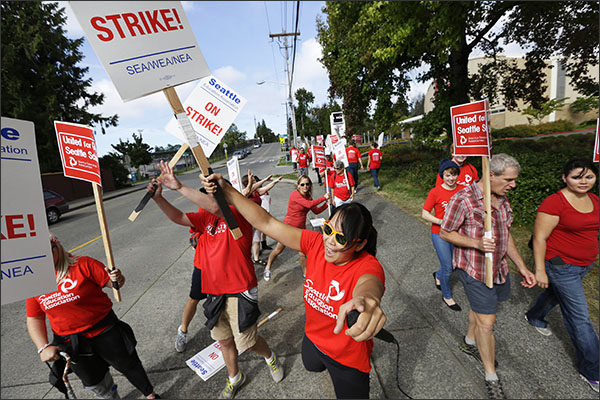The Associated General Contractions of Washington (AGCW) has filed an unfair labor practice charge against 17 Seattle-area labor unions that comprise the Seattle Building & Construction Trades Council.
In the complaint filed with the Region 19 National Labor Relations Board in Seattle, AGCW argues the Community Workforce Agreement (CWA) negotiated between the labor unions and the Washington State Department of Transportation (WSDOT) for the SR-520 Montlake to Lake Washington Interchange and Bridge Replacement Project violates federal law because the terms of the CWA were negotiated solely between WSDOT and the 17 unions, with no input from the contractors or subcontractors who will actually work on the $455 million project.
The terms of the CWA were included as part of the project bid specifications, meaning every contractor who bids for the job must agree to what WSDOT and the unions negotiated. This includes union giveaways such as requiring every contractor and subcontractor, union and nonunion, on the project to force their workers to pay union dues to one of the 17 local unions or be barred from working on the project. The CWA also mandates that only three employees of an open-shop contractor’s workforce can be employed on the project without union approval (doubtless that approval hinges on whether the worker agrees to pay those union dues), effectively ensuring nonunion workers have no opportunity to work on the taxpayer funded project unless they pay the union.
The AGCW complaint concludes that forcing contractors to abide by the CWA negotiated by unions and WSDOT violates the National Labor Relations Act because it was done with no input from the contractors who will actually employ the workers on the project. In other words, unions and WSDOT have dictated mandatory terms of a private labor agreement between contractors and their employees with those contractors having absolutely no say in the negotiations. Not only is WSDOT not an employer of any worker on the project, the unions with which the CWA was negotiated do not represent any of the workers. And according to the complaint, some of the 17 unions that negotiated the CWA will not even have a role on the project. But workers will be forced to pay those unions in order to work.
The complaint says that since WSDOT is not an employer of any worker on the project, the state agency has no standing under the law to negotiate a CWA with labor unions.
AGCW points out the NLRB has held that labor unions and the owners of a construction project may not enter into labor agreements that require the construction contractor and subcontractors hired by the owner to sign such “Project Labor Agreements.” Instead PLAs are supposed to privately initiated and negotiated by the contractor who has been hired for the project and the union. A union entering into such a forced agreement with a project owner has engaged in an unfair labor practice.
AGCW says the CWA negotiated between WSDOT and the 17 labor unions is no different than a Project Labor Agreement and so should be subject to the same NLRA laws.
The complaint also claims the CWA negotiated by WSDOT and the labor unions discriminates against the employees of nonunion contractors and violates the U.S. Supreme Court’s recent landmark ruling in Janus v. American Federation of State, County and Municipal Employees that protects government workers from forced financial support of a labor union.
CWAs and PLAs on public projects have long been criticized for being anti-competitive, driving up costs and discriminating against small, nonunion contractors, especially women and minority owned contracting firms. The AGCW says the CWA is “likely one of the reasons that all three bidders exceeded WSDOT’s estimated cost range.”
While Washington is one of a handful of states with an executive order encouraging the use of PLAs (about three-fourths of workers on publicly financed projects in Washington are union labor), and the City of Seattle has its own law mandating PLAs, a growing number states have banned Project Labor Agreements on public construction projects in recognition of their costly and discriminatory nature.




